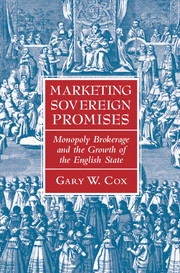Book contents
- Frontmatter
- Contents
- List of Tables and Figures
- Preface
- 1 Sovereign Credibility and Public Revenue
- PART I THE GLORIOUS REVOLUTION AND THE ENGLISH STATE
- 2 The Market for Taxes and Platforms
- 3 More Credible Platforms, More Taxes
- 4 Pricing Sovereign Debts
- 5 Establishing Monopoly Brokerage of Sovereign Debts
- 6 The Consequences of Monopoly Brokerage of Debt
- 7 Property Rights
- 8 From Constitutional Commitment to Industrial Revolution
- 9 Summarizing the Revolution
- PART II THE ENGLISH CONSTITUTIONAL DIASPORA
- References
- Index
- Miscellaneous Endmatter
7 - Property Rights
from PART I - THE GLORIOUS REVOLUTION AND THE ENGLISH STATE
Published online by Cambridge University Press: 05 May 2016
- Frontmatter
- Contents
- List of Tables and Figures
- Preface
- 1 Sovereign Credibility and Public Revenue
- PART I THE GLORIOUS REVOLUTION AND THE ENGLISH STATE
- 2 The Market for Taxes and Platforms
- 3 More Credible Platforms, More Taxes
- 4 Pricing Sovereign Debts
- 5 Establishing Monopoly Brokerage of Sovereign Debts
- 6 The Consequences of Monopoly Brokerage of Debt
- 7 Property Rights
- 8 From Constitutional Commitment to Industrial Revolution
- 9 Summarizing the Revolution
- PART II THE ENGLISH CONSTITUTIONAL DIASPORA
- References
- Index
- Miscellaneous Endmatter
Summary
As noted in Chapter 1, North and Weingast's thesis that property rights became more secure after the Glorious Revolution has been disputed by subsequent scholars investigating rates of return on capital assets. In this chapter, I begin by reviewing their evidence.
I then consider when monopoly brokerage of property rights developed, showing that key elements emerged in the thirteenth century. After this point, enforcement of domestic property rights should have been reasonably secure. Thus, unlike North and Weingast, I do not predict an across-the-board improvement in property rights at the Revolution.
That said, some kinds of property were not governed by the system of monopoly brokerage built up around the common-law courts. First, the conciliar courts had long competed for litigation over foreign trading rights (Jha 2012; Harris 2013). Second, rights to develop property had long been conferred in a duopolistic market, with both courtiers and parliamentarians vying for business (Bogart 2005, 2011a; Bogart and Richardson 2011). In each of these markets, the Revolution marked a watershed.
Rates of Return on English Property
To assess North and Weingast's claim that property rights became more secure after the Revolution, Clark argues as follows. First, insecure private property rights tend “to deter investment in capital … unless the return on capital rises sufficiently to compensate for the enhanced risk” (1996 p. 566). Thus, second, if property rights became more secure after the Glorious Revolution, one should see a decline in the rate of return on capital. But, third, no such decline appears in the historical record.
To establish his third point, Clark examines a large sample of charities’ assets – such as land, tithes, houses, rent charges, and private bonds – over the period 1540–1837. Looking for correlations between political events and rates of return, he finds none in the seventeenth century, and concludes as follows: “Secure private property rights existed in England at least as early as 1600, and probably much earlier. As far as most private investors were concerned, nothing special happened in 1688 or, for that matter, in any period between 1600 and 1688” (p. 565).
Quinn undertakes a detailed study of a prominent London banker's portfolio before and after the Revolution. He finds that the Revolution “seems to have raised, not lowered, rates on private debt” (2001, p. 593).
- Type
- Chapter
- Information
- Marketing Sovereign PromisesMonopoly Brokerage and the Growth of the English State, pp. 84 - 99Publisher: Cambridge University PressPrint publication year: 2016



